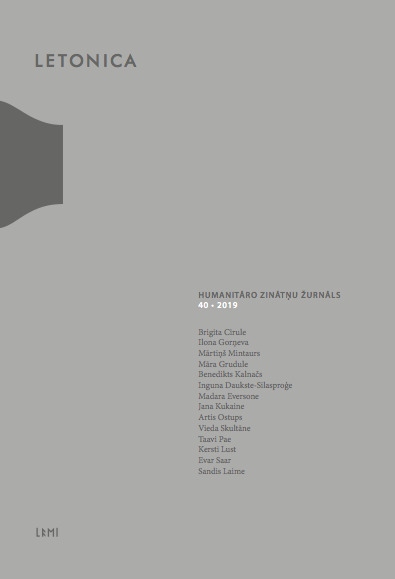Latviešu literatūras vēstures recepcija no 1945. līdz 2015. gadam
The Reception of Latvian Literary History between 1945 and 2015
Author(s): Māra Grudule, Benedikts KalnačsSubject(s): Comparative Study of Literature, Latvian Literature, WW II and following years (1940 - 1949), Post-War period (1950 - 1989), Transformation Period (1990 - 2010)
Published by: Latvijas Universitātes Literatūras, folkloras un mākslas institūts
Keywords: Latvian literature; literary history; literature and ideology; regional literature; comparative literature;
Summary/Abstract: This article focuses on the reception of Latvian literary history in the period between 1945 and 2015. The authors pay attention to the following aspects: a) the beginnings of Latvian literary history in the 19th and early 20th centuries; b) the role of Soviet ideology in the aftermath of WWII; c) literary history writing in exile; d) new trends in literary history at the turn of the century; e) the development of regional literatures and comparative aspects of literary history. Following a rather modest initial phase in the 19th century, the histories of Latvian literature matured during the period of independence in the 1920s and 1930s. A major achievement was marked by the publication of the three-volume history by Teodors Zeiferts, Latviešu rakstniecības vēsture (Latvian Literary History; 1922–1925), which summarized the earlier literary history writing focusing on texts in Latvian from a comparative perspective. During the authoritarian regime in Latvia established in 1934, great emphasis was put on a detailed description of national features in the literary process and close observations of a particular author’s biography. Attention was also drawn to the discussion of specific literary texts that might fit into the literary canon. To this aim, a six-volume history edited by Ludis Bērziņš “Latviešu literatūras vesture” (Latvian Literary History; 1935–1937) was created. Alongside it many other state-supported activities promoted the unique qualities of Latvian letters. However, it must be kept in mind that these descriptions were made against the background of extensive studies of other literary cultures. The outbreak of WWII and the occupation of Latvia marked the beginning of a new phase. Research of Latvian literature in Soviet Latvia was strongly influenced by the ideological pressure of the regime. The presence of ideology was also considered to be an overarching principle of literary history writing. The most representative text of this new era was “Latviešu literatūras vesture” in 6 volumes (Latvian Literary History; 1956–1962), created by a research team at the Soviet Latvian Academy of Sciences under the leadership of Ēvalds Sokols. This publication alongside others manifested an almost complete omission of the comparative approach to any literary phenomena beyond the possible exception of proletarian literature. The idea of literary history as a process through which a certain nation establishes its values and identity, while at the same time constantly remaining in contact with other literary cultures, was completely abandoned. Only gradually within the following decades a certain recovery of the complexity of interpretation of literary processes became possible. Literary history writing in exile was initially focused on the practical needs to provide school textbooks. The most brilliant publication on literary history during this period was Andrejs Johansons’s monograph, “Latviešu literatūra” (Latvian Literature; 1953–1954), published in Sweden. In this as well as in his other publications Johansons exemplified the comparative approach of exile scholars to demonstrate deep affinities between Latvian and European cultural history and creative thought. Only gradually research trends in exile and in Latvia became mutually comprehensive as exemplified by the publications of literary and book historian Aleksejs Apīnis. A new wave of literary history writing intensified at the end of the 20th century with the publication of the 1999 monograph “Latviešu literatūras vesture” (Latvian Literary History) by Guntis Berelis, as well as the collective monograph on the history of Latvian literature in three volumes (1998–2001) where researchers from Latvia and exile co-operated under the guidance of Viktors Hausmanis and Valters Nollendorfs. A new tradition is currently being developed by a new series of individual monographs that so far have covered the period up to the mid-19th century. Publications in exile also paid close attention to the cultural specificity of the development of a literary tradition in Latgale, the Roman Catholic region of Latvia. Current research is continuing the evaluation of this tradition, alongside other investigations that pay attention to comparative contexts of Latvian literature. The article is concluded with an evaluation of the importance of case studies and relevant methodology for the development of the 21st-century literary history writing.
Journal: Letonica
- Issue Year: 2019
- Issue No: 40
- Page Range: 44-60
- Page Count: 17
- Language: Latvian

